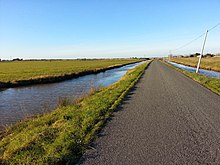You can help expand this article with text translated from the corresponding article in French. (May 2015) Click for important translation instructions.
|
46°55′28″N 2°03′14″W / 46.924476°N 2.053757°W / 46.924476; -2.053757
| Designations | |
|---|---|
| Ramsar Wetland | |
| Official name | Marais Breton, Baie de Bourgneuf, Ile de Noirmoutier et Forêt de Monts |
| Designated | 2 February 2017 |
| Reference no. | 2283 |

The Marais breton (French pronunciation: [maʁɛ bʁətɔ̃], "Breton Marsh"; or Marais breton-vendéen) is a zone géographique humide (humid geographic zone) along France's Atlantic coast. It marks the border between two traditional French provinces, Brittany and Poitou, and extends between two French departments, Loire-Atlantique and Vendée, both of which included in the administrative region of Pays de la Loire.
The Marais breton is protected by levees and dunes, stabilized by the pines of the forest of Pays de Monts. Some areas, such as Bouin are below sea level and were once subject to storm surges. A valve system blocking salt water from entering portions of the marsh was also developed to accommodate the marsh waters to agriculture.
Culture
The Marais Breton has a tradition of music and dance similar to its neighbors the Bocage vendéen and Upper Brittany, but it also has its own local instrument, the veuze bagpipe, and its own dance, the Maraîchine.
Fauna and flora
Per the Natura 2000, the Marais breton is part of a larger geographic cadre which also include the forêt des Pays de Monts, the Bay of Bourgneuf, and the île de Noirmoutier.
See also
References
- "Marais Breton, Baie de Bourgneuf, Ile de Noirmoutier et Forêt de Monts". Ramsar Sites Information Service. Retrieved 25 April 2018.
- "Marais Breton, baie de Bourgneuf, île de Noirmoutier et forêt de Monts". Natura 2000. Archived from the original on 26 July 2010. Retrieved 4 August 2011.
External links
- écomusée du Marais breton
- Le site de l'Association pour le Développement du Bassin Versant de la Baie de Bourgneuf